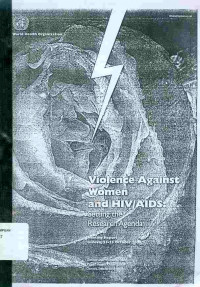
Text
Violence against women and HIV/AIDS: setting the research agenda meeting report Geneva, 23-25 october 2000
This report is divided into three main sections. The first section contains a summary of each presentation. The second section summarizes the discussion and the third details the recommendations and conclusions from the meeting. infection both directly through forced sex and indirectly by constraining women’s ability to negotiate the circumstances in which sex takes place and the use of condoms. In addition, sexual abuse during childhood seems to be associated with high-risk behaviours in later stages of life that may also increase the risk of HIV. However, many questions remain as to the extent of this increased risk and the precise interactions between different forms of violence against women (VAW) and HIV/AIDS. Further research is needed to understand exactly how these two areas overlap.The extent to which interventions can effectively address both problems also requires further research and collaboration between those working on VAW and those working on HIV/AIDS. It was with this in mind that WHO convened an expert consultation “Violence Against Women and HIV/AIDS: Setting the Research Agenda” from 23-25 October 2000, to take stock and learn from existing research.The impetus for the meeting came from discussions with UNAIDS on the development of an HIV/AIDS component for inclusion in the WHO Multi-country Study on Women’s Health and Domestic Violence Against Women. It became clear however, that it was necessary and timely to have a more wide-ranging review of what was known, what research was ongoing and what gaps existed on the intersections between violence against women (VAW) and HIV/AIDS. This in order to come up with a comprehensive research agenda on the same. This concern was further strengthened by debates at the International Conference on HIV/AIDS held in Durban, South Africa, which for the first time included a number of presentations on violence against women. The issue of post-exposure prophylaxis (PEP) following rape was one of controversy at Durban, so it was decided to have the third day of the meeting specifically focused on that issue.
Availability
| KP.IX.000191 | KP.IX INT v | My Library | Available |
Detail Information
- Series Title
-
-
- Call Number
-
KP.1 INT v
- Publisher
- Jenewa : World Health Organization (WHO)., 2000
- Collation
-
63p. ; 30cm.
- Language
-
English
- ISBN/ISSN
-
-
- Classification
-
KP.1
- Content Type
-
-
- Media Type
-
-
- Carrier Type
-
-
- Edition
-
-
- Subject(s)
- Specific Detail Info
-
-
- Statement of Responsibility
-
-
Other version/related
No other version available
File Attachment
Comments
You must be logged in to post a comment
 Computer Science, Information & General Works
Computer Science, Information & General Works  Philosophy & Psychology
Philosophy & Psychology  Religion
Religion  Social Sciences
Social Sciences  Language
Language  Pure Science
Pure Science  Applied Sciences
Applied Sciences  Art & Recreation
Art & Recreation  Literature
Literature  History & Geography
History & Geography